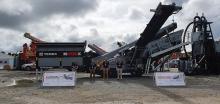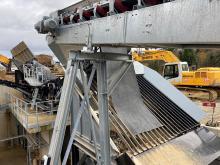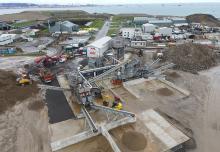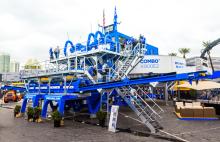Campbell Contracts’ CDE installation – including an M2500 washing plant, AggMax scrubbing and classification system and AquaCycle thickener – is proving a big money earner for the County Fermanagh, Northern Ireland-based company. The plant’s highly productive and efficient operation near Enniskillen has enabled Campbell Contracts to increase its annual sand product sales by an eye-catching 90%.
Before investing in its state-of-the-art CDE solution, Campbell Contracts had clay-bound sand and gravel, primary scalpings, and crushed rock fines that they could not process into saleable aggregates and sand. Now, all such material is turned into a high-quality final product. This is especially important in an area where good sand is not readily available, often needing to be trucked in from over 30 miles away.
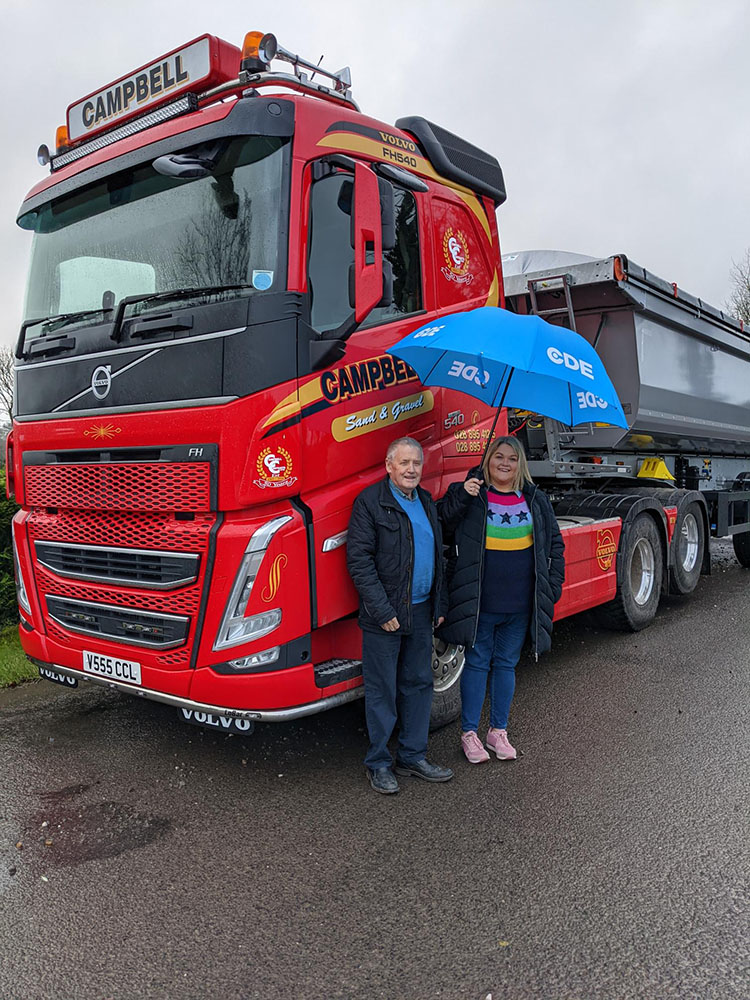
Campbell Contracts’ previous washing plant was over 30 years old. While it worked reasonably well with cleaner sand and gravel deposits, processing up to 30 tonnes of product per hour, it struggled with more clay-bound material. Historically, such difficult material was backfilled into the pit and buried. The dirty primary scalpings, a by-product of Campbell Contracts’ quarrying operations, could also not be processed by the existing washing plant, leaving it stockpiled on site.
Speaking to Aggregates Business, Grainne Quinn, a Campbell Contracts’ director, said that the firm has been very impressed with its CDE washing plant. The tailored solution can process up to three aggregates and two sand products simultaneously. For Campbell Contracts, the plant is currently processing 60 tonnes of aggregate and 60 tonnes of sand product an hour 10 hours a day Monday to Friday. The plant also runs for 6-7 hours on Saturdays. Campbell Contracts had put more than 350,000 tonnes of material through its premium CDE washing plant by the time of Aggregates Business’s site visit on 7 December 2021.
Quinn says that being able to monetise what had been previously unsellable material, coupled with general production quality and efficiency gains, had allowed Campbell Contracts to make a return on its CDE washing plant investment in just two years.
“We had initially looked at a payback of five to six years, so the plant has exceeded our expectations,” says Quinn. “We had been using our old washing plant since the early 1980s, but the customer demand for sand is huge; there was no way we could meet it with our existing setup.
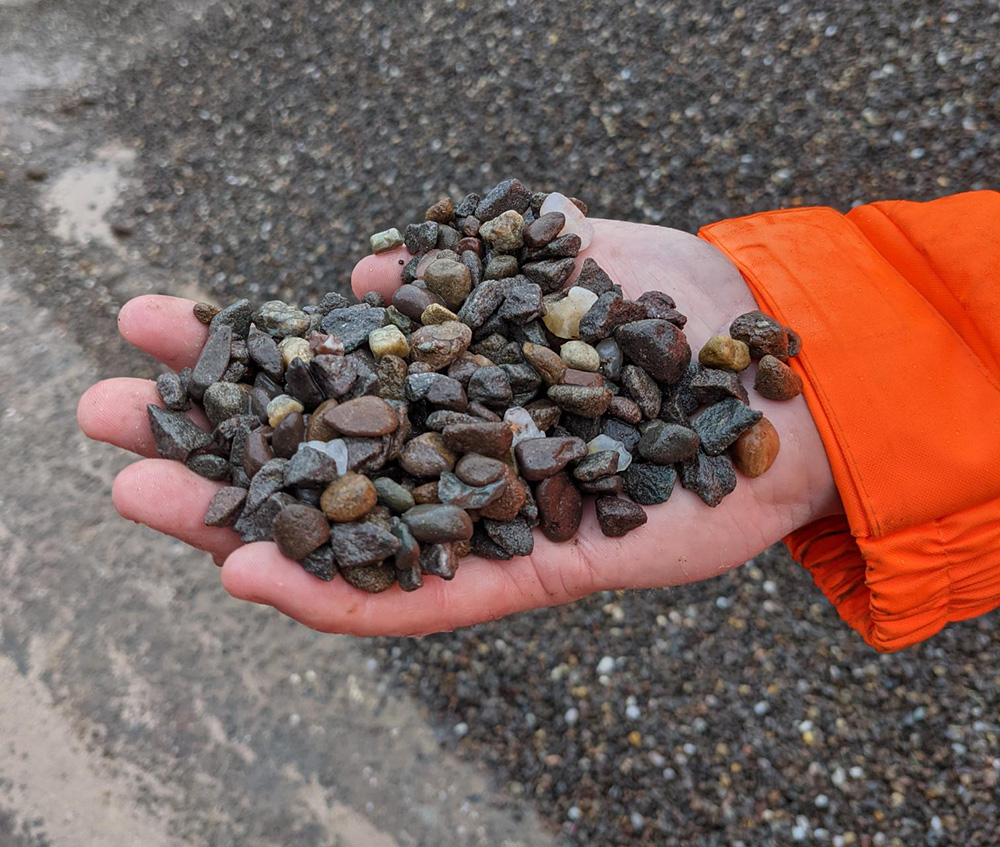
“We spoke to a number of washing plant manufacturers but were very impressed with CDE from the start. They knew exactly what we needed and were good people to work with. We placed the order for the new washing plant in early 2019, and it was installed in October 2019. The AquaCycle was added this year [2021].
“The amount of quality sand we can produce with the CDE plant is great, as is our ability to process what was waste material. Previously, some of our big concrete plant customers thought some of our sand product was a bit fine.”
Asked about any issues with the CDE washing plant, Quinn says: “As with any piece of equipment, we had some teething troubles getting the outputs exactly where we wanted them, but CDE worked with us until we and our customers were 100% happy.”
A longstanding family-run business, Campbell Contracts has traded since 2002 after initially being established by Quinn’s father, Jim Campbell, in 1968 as J.P Campbell Plant Hire. Campbell Contracts has a large and loyal customer base across the concrete supply and highways and infrastructure sector. Campbell Contracts also operates a highly successful civil engineering business and has a fleet of 30 tipper trucks.
“We look to buy a new tipper truck every year and this year also bought a new Volvo articulated hauler,” says Quinn. “We generate a lot of gravel stone, and I’d like to add to the current CDE plant setup – something like an oversized fines crusher. That would reduce waste even further along with the hauling requirement.”
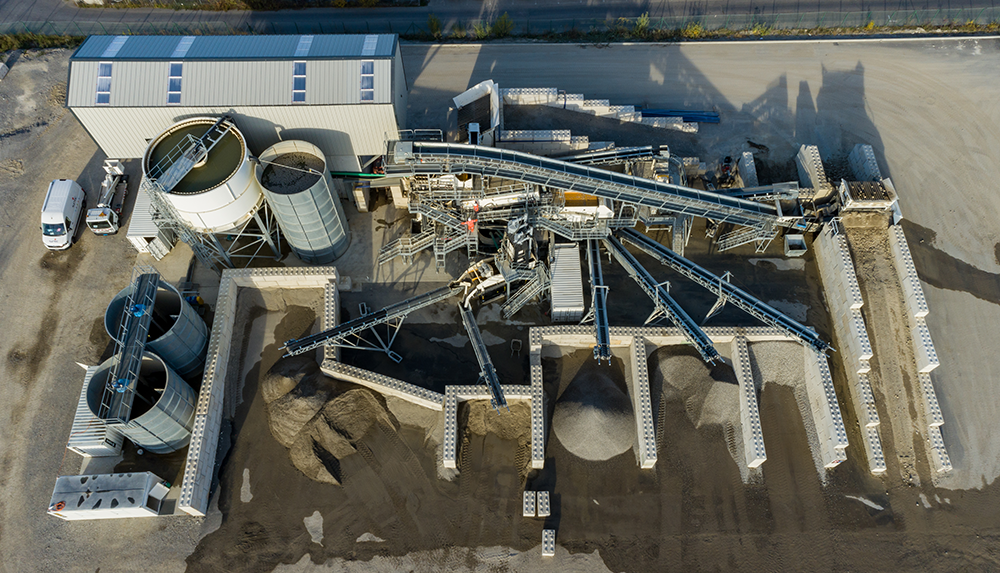
As illustrated in the bespoke solution for Campbell Contracts’ aggregates and sand processing site near Enniskillen, CDE’s aggregates and sand washing plants tackle numerous customer issues, including the loss of quality fines to site settling ponds and clay contamination of feed material. Equipped with CDE’s patented Infinity screens technology, the plants efficiently remove -63 micron / 200 mesh material from sand and aggregate products while also recycling up to 90% of production process water for recirculation, eliminating the requirement for settling ponds.
Terex Washing Systems has completed the installation of a wash recycling plant based in Geneva, Switzerland. The wash plant converts construction, demolition and excavation waste into two sands and three aggregate products that are stockpiled for use in the production of asphalt. All this is achieved while recycling up to 95% of the water used during the washing process.
The Terex Washing Systems engineers used over 60 years of industry experience and a product from their sister company Terex MPS to find solutions that would meet the customer’s needs. A complete crushing, screening and washing solution was provided to the customer on a compact footprint to meet their specific requirements. The aim was a throughput of 100 tonnes per hour with the option of crushing oversized material.
The wash plant consists of an FM 120 2-G Sand Plant, an Aggrescrub 150 Log Washer complete with pre-screen and a Terex MPS Impact Crusher. This section of the wash plant washes, classifies and stockpiles aggregates while recovering two specifications of sand. Any oversized material fed into the system is directed towards the Terex MPS crusher, where it is crushed down to a manageable size before being fed back into the washing system. The customer can also feed oversized material directly into the crusher.
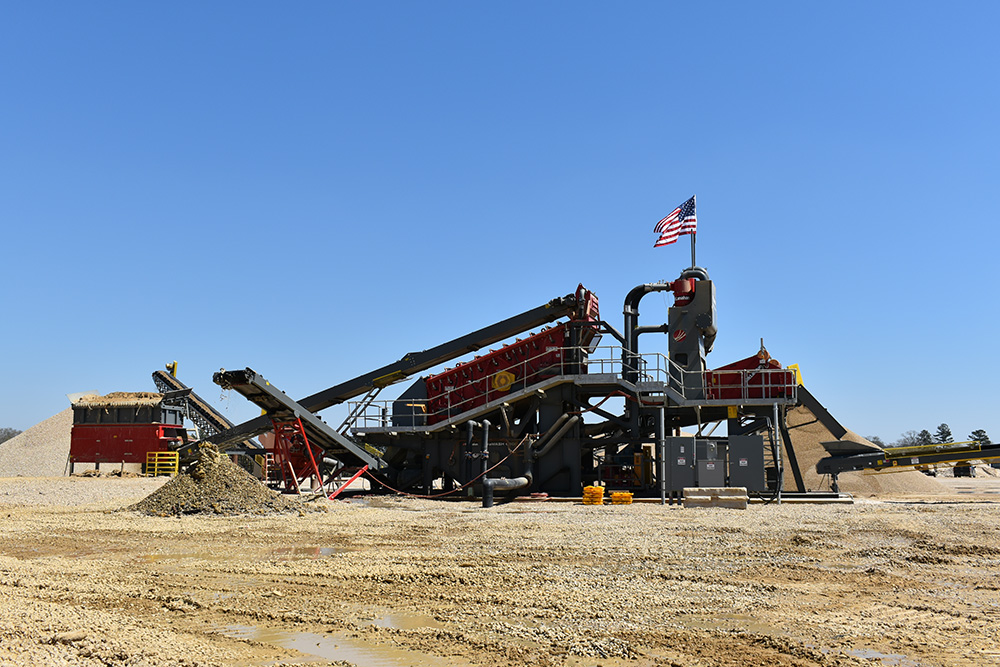
A fully integrated water treatment plant consisting of a deep cone thickener, flocculant dosing unit, and a filter press allows up to 95% of the water used in the washing process to be re-used. The dirty water is collected in a sump before being treated and allowed to settle in the deep cone thickener. The thickened sludge is then compressed within the filter press so that the last remaining water is sent back into the system. The customer can then sell the filter cakes that are expelled from the filter press.
The Geneva-based customer can now divert thousands of tonnes of construction, demolition and excavation waste from landfill each year. It can achieve this while producing six different products to be sold or used during asphalt production and further reducing the environmental impact thanks to the water treatment plant.
Johnston Patterson, product and applications manager at Terex Washing Systems, said: “We have provided a complete end-to-end wash recycling solution for the customer. Our ability to fully integrate washing, crushing and water treatment allows us to design and manufacture systems that perform to a higher standard. Everything is here, from feeder to filter press.
“This washing system provides the customer with a sustainable production line of sand and aggregate products from material that would otherwise be sent to landfill.”
The cost of a permanent plant is normally offset by higher throughput and a long-life span of the deposit. When higher throughput is not needed or possible, a modular wash plant can be put in place at a lower capital investment and deliver the required production level. The advantage of shipping a plant in containers does impact the size of the equipment, so throughput is lower than with permanent plants.
With a long history of designing, manufacturing and installing modular wash equipment, U.S. company McLanahan’s line of UltraWASH modular wash plants is said to supply the reliability, simplicity and efficiency that producers need from a modular plant.
All equipment that is part of the UltraWASH plants, including the vibratory screen, hydrocyclones, dewatering screen, sump and pump, is based on the company’s well-known, field-proven designs. UltraWASH plants are said to offer a quick, easy-to-install processing system. These modular wash systems are ideal for producers facing criteria such as planning permits, multiple locations, short-term deployment, or an unknown/variable feedstock (for example, C&D waste stream applications) that make implementing a customised, fixed processing solution difficult.
McLanahan says that one advantage of a modular wash plant is they tend to be fully designed and ready out of the box. They are manufactured on demand or are already in stock for faster deployment. Modular wash plants can be custom-designed for specific applications. But in the case of a time-sensitive application, the standard unit will fit the situation better even if it is not an exact fit.
McLanahan currently offers nine different sizes and configurations for its UltraWASH, which can produce up to three aggregate products and up to two sand products. There is a single process water feed point and a single effluent discharge point. In addition to offering various configurations for helping producers meet their production goals, McLanahan designs and produces equipment for all stages of the wet process, from feed preparation to water treatment. These equipment offerings are available as add-on modules that can include log washers, blade mills and coarse material screws for feed prep, attritioning modules for specialty sand production, an organics removal module, an EcoCYCLE thickener for water treatment and an EcoPRESS filter press for complete wastewater treatment.
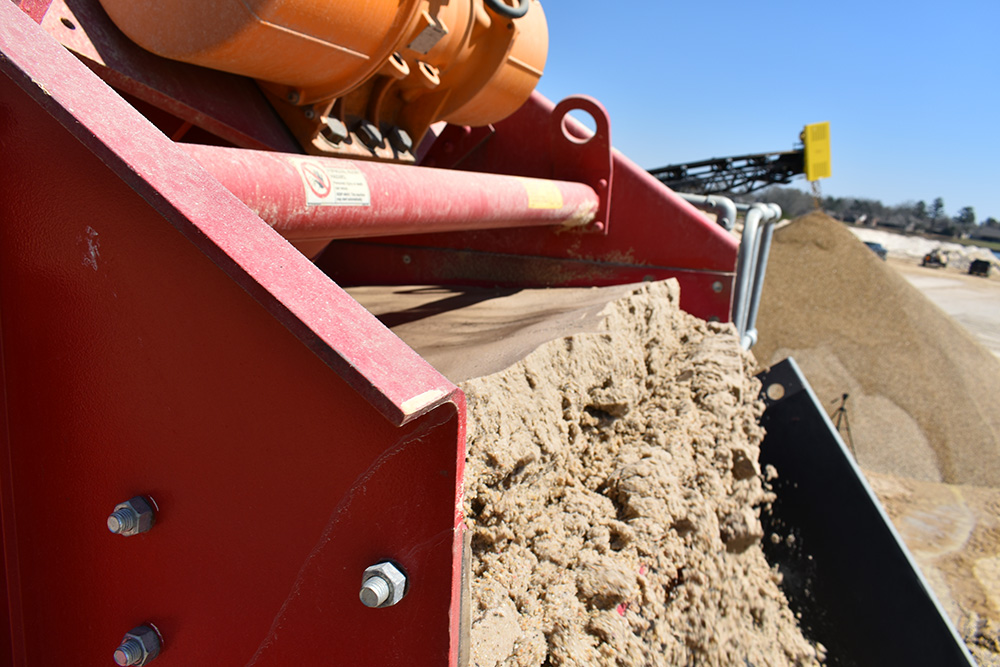
McLanahan UltraWASH also offers three different wash options, each with its benefits to the end-user.
The single wash model can create up to three aggregate products and one sand product. The feed is divided by the sizing screen, and the clean aggregate is separated and stockpiled with conveyors. The sand fraction is mixed with water in the sump and pumped to a pair of hydrocyclones, which remove the silts and clays before excess water is removed from the sand by the dewatering screen ahead of stockpiling.
The double wash model is ideal for extra dirty sand and requires additional contaminant removal. The difference between the double wash and single wash model is the addition of a divided sump and secondary pump. Sand mixes with water in one side of the sump and is pumped to a large hydrocyclone, where the first pass removal of silts and clays is affected. The product of this process is a partially cleaned sand that is discharged back to the other side of the divided sand sump, from where it is picked up again and pumped to the smaller, secondary hydrocyclone for removal of the remaining silts and clays before being discharged onto a dewatering screen for excess water removal.
The twin sand variant allows the creation of separate coarse and fine sand products. This model also includes a divided sump and two hydrocyclone circuits and adds a split-deck dewatering screen. In the twin sand model, the bottom deck of the sizing screen is divided, allowing the coarse sand fraction to fall into one side of the sump and the fine sand fraction to fall into the other side. The coarse and fine sands are then pumped separately to the hydrocyclones for single-pass removal of silts and clays. The sand is discharged onto separate sides of the dewatering screen for excess water removal, primary product blending and separate stockpiling.
McLanahan says that by selecting a plant that has been configured to address the specific needs of your application and provide long-term benefits to your site, you will see long-term advantages to the operation, capacity and most importantly, profit. The OEM (original equipment manufacturer) adds that expanding your plant means growing or changing your production capability and profits. When planned accordingly, an UltraWASH modular wash plant can include easily adjustable features that can improve your operation’s capacity and allow you to meet new demands.
Palermo port authority invests in Baioni washing & recycling plant
The Italian waste management firm Profeta has recently started a new washing and recycling plant at its waste recycling and processing facility in the Sicilian port of Palermo.
The new 10 tonnes/hour Baioni wet processing solution includes an integrated magnetic separator for separating non-ferrous metals from the waste stream.
Profeta will use the new Baioni plant with existing waste recycling and grading plants to recycle up to 90% of all incoming dry waste streams from its industrial and naval shipbuilding activities, producing recycled aggregates for the construction and recycling industry.
Profeta says the Baioni solution will help treat waste, like soils and sediments, using water with additives and reagents to ease the physical washing process of aggregates. Soils are subjected to multi-stage treatments while clarified water is reintroduced into a closed-circuit cycle.
The process helps the particle-size separation of the coarser fractions (such as sand and gravel) from silt and clay, concentrating the pollutants separately. After the process treatment and after accurate test analysis, the coarser particle-size fractions can be used again or relocated to the site of origin. The finer fractions, where all pollutants are concentrated, can now be sent for final disposal.
Before the new plant installation, Profeta hosted Baioni at the port of Palermo to allow the manufacturer to gain a better understanding of the firm’s needs and requirements. Profeta’s owner, Aldo Profeta, chose to partner with Baioni as he believed the company had an in-depth knowledge of the project and was confident in its long-time expertise in aggregates washing processes.
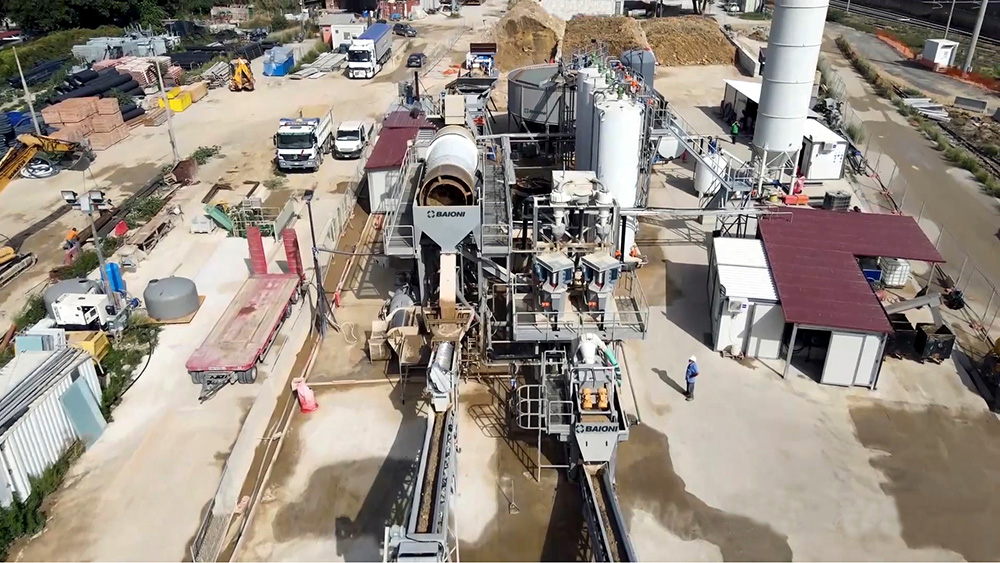
Baioni has commissioned its ST 200 washing trommel, GRF hydrocyclone fines recovery plant and Baiwash water management system to run alongside Profeta’s existing waste recycling and grand plants setup.
Utilising Baioni technology, the new plant will enable Profeta to produce +2 mm gravel (36%), 0.063-2mm sand (30%), -0.063mm silt and clay (34%).
The Baioni plant offers flexibility in processing waste with varied granulometric characteristics of the waste to be treated. Larger particle sizes are separated utilising hydrocyclones and screens; both are highly productive.
Turnkey processing systems from Baioni come with a feeding process using a feed hopper equipped with protections and clod breakers and sensors for detecting and removing magnetic ferrous materials.
The second processing stage is washing and particle-size separation, leading to the transfer of contaminants from the solid waste matrix to the washing fluid (water or seawater) and separating the contaminated fractions from the recoverable ones.
Material washing is done in an ST 200 washing trommel followed by a wet screening of the coarse materials and a refining section of the sands using two Baibac Baioni attrition scrubbers. The third processing stage is the water treatment process using a highly efficient Baiwash water management system that significantly reduces water consumption by ensuring up to 90% of process water is recycled for immediate recirculation. The Baioni water treatment unit, consisting of a thickener and polymer station, minimises the loss of valuable fines and reduces water and energy costs.
The final Baioni washing and recycling plant processing stage is fine fraction thickening, where sludge is concentrated in Baiwash thickener and a chemical plant. Sludge is further dehydrated through a solid/liquid separation process using a Baidec decanter. This process ensures a considerable reduction in waste going to landfill.
Profeta says its investment in a Baioni solution exemplifies the company’s commitment to environmental protection. The company has ordered a second Baioni washing and recycling plant for a different site, further demonstrating its environmentally conscious working practices and saving money by reducing waste and increasing efficiency.
Matec solution for Stuart Partners
Stuart Partners (Stuarts) operates a quarry located in Hill Barton Business Park near Exeter in Devon, southwest England. The company is licensed by the Environment Agency to handle the disposal or recycling of inert waste.
Since 1988, Stuarts have progressed from filling a hole in the ground to operating a successful recycling facility. Most of the material now brought into the firm’s quarry is recycled, with over 80,000 tonnes of inert waste processed each year. A proportion of that is then resold as crushed hardcore material sized 0-2mm, 2-5mm, 5-12mm, 12-24mm, 24-50mm, and +50mm.
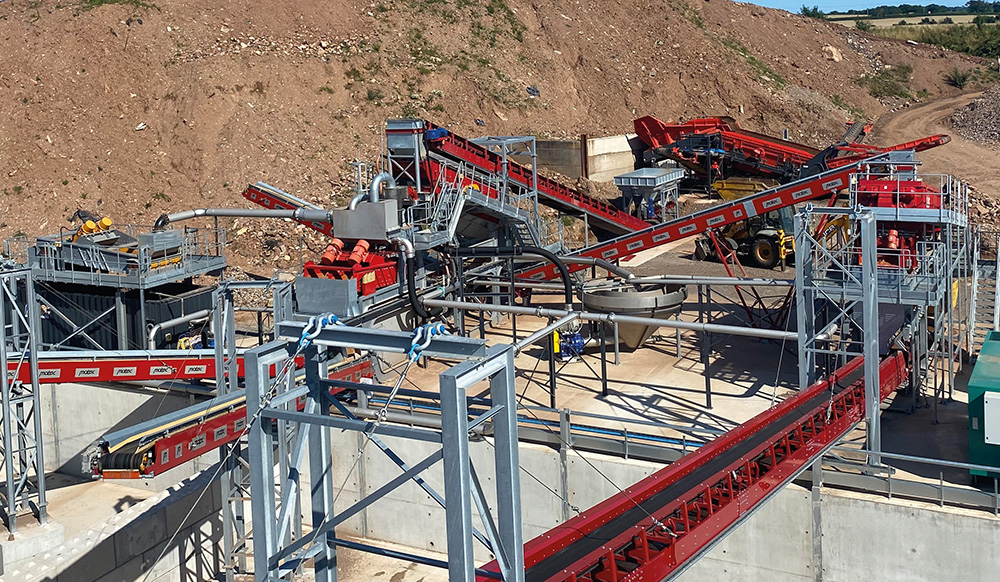
To help Stuarts meet its quality and productivity targets, Italian washing plant experts Matec Industries recently supplied a complete, compact and mobile plant. The installation includes an Aggretec 150 washing plant and a SCREENTEC two-deck, 1500mm x 5000mm mesh vibrating screen with free oscillation. The unit can process an initial feed size of up to 200mm.
The Matec plant setup also includes an up to 80 tonnes/hour SANDTEC sand recovery unit with hydrocyclones. The SANDTEC has a maximum wastewater capacity of 5000 litres/minute.
Furthermore, Matec installed a SCRUBTEC log washer model with a 50m³/hour and up to 70mm feed size capacity, a water treatment plant comprising a filter press with 170 1500mm x 1500mm plates, a stainless-steel vertical thickener (decanter), an automatic flocculant station, and a slurry homogeniser tank.

